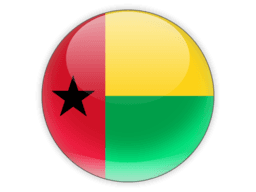
Regions of Guinea-Bissau
Explore 9 regions
Cities of Guinea-Bissau
Discover 23 cities across 9 regions
Biombo(1)
Bissau(1)
Cacheu(6)
Quinara(1)
Tombali(2)
Other Cities (1)
Guinea-Bissau is a small country located in West Africa, bordered by Senegal to the north and Guinea to the south and east. The country has a population of approximately 2 million people and its official languages are Portuguese and Crioulo.
The capital city of Guinea-Bissau is Bissau, which is located on the coast and is home to the country's largest airport. The country's economy is primarily based on agriculture, with the main crops being rice, cashew nuts, and groundnuts. Fishing and forestry also play important roles in the economy.
Tourism is a growing industry in Guinea-Bissau, with visitors attracted to the country's beautiful beaches, natural parks, and rich cultural heritage. Some of the top tourist attractions in Guinea-Bissau include the Bijagos Archipelago, which is home to many species of birds and sea turtles, the Orango Islands National Park, and the Bolama Island, which is a former colonial capital.
However, Guinea-Bissau faces a number of challenges, including political instability and poverty, which can impact the safety and security of travelers. Visitors are advised to exercise caution, particularly in rural areas and at night, and to consult with local authorities before traveling to any potentially risky areas. It is also recommended to obtain the necessary vaccinations before traveling to Guinea-Bissau.
Telephone Code
245
Local Emergency Phone
Local numbers only
Vaccinations
An International Certificate of Vaccination for yellow fever is required for all travelers. See WHO recommendations. On 21 March 2022, the US Centers for Disease Control and Prevention (CDC) issued a Travel Alert for polio in Africa; Guinea-Bissau is currently considered a high risk to travelers for polio; the CDC recommends that before any international travel, anyone unvaccinated, incompletely vaccinated, or with an unknown polio vaccination status should complete the routine polio vaccine series; before travel to any high-risk destination, CDC recommends that adults who previously completed the full, routine polio vaccine series receive a single, lifetime booster dose of polio vaccine.
Climate
Tropical; generally hot and humid; monsoonal-type rainy season (June to November) with southwesterly winds; dry season (December to May) with northeasterly harmattan winds
Currency (Code)
Communaute Financiere Africaine francs (XOF)
Electricity/Voltage/Plug Type(s)
220 V / 50 Hz / plug types(s): C
Major Languages
Crioulo (lingua franca), Portuguese; largely used as a second or third language), Pular (a Fula language), Mandingo
Major Religions
Muslim 45.1%, Christian 22.1%, animist 14.9%
Potable Water
Opt for bottled water
International Driving Permit
Suggested
Road Driving Side
Right
Tourist Destinations
Orango Island; Bubaque Island; Cathedral de Nossa da Candelaria
Major Sports
Soccer
Cultural Practices
It is customary to give or receive gifts and business cards with the right hand.
Tipping Guidelines
Tip 10-15% of the bill at upscale restaurants. Round up the fare for taxi drivers. Guides and tour drivers expect around 10% or more if trips are multiday. Tip hotel cleaning staff at your discretion.
Souvenirs
Carved tribal masks and wooden statues, beaded jewelry or precious metals items, handmade cloth, beauty products, pottery, baskets
Traditional Cuisine
Jollof rice — rice cooked in palm oil and served with tomato paste and onions; sometimes with added fish or meat
Geography
Area
total: 36,125 sq km
land: 28,120 sq km
water: 8,005 sq km
Climate
tropical; generally hot and humid; monsoonal-type rainy season (June to November) with southwesterly winds; dry season (December to May) with northeasterly harmattan winds
Natural resources
fish, timber, phosphates, bauxite, clay, granite, limestone, unexploited deposits of petroleum
People and Society
Population
2,078,820 (2023 est.)
Ethnic groups
Balanta 30%, Fulani 30%, Manjaco 14%, Mandinga 13%, Papel 7%, unspecified smaller ethnic groups 6% (2015 est.)
Languages
Portuguese-based Creole, Portuguese (official; largely used as a second or third language), Pular (a Fula language), Mandingo
Religions
Muslim 46.1%, folk religions 30.6%, Christian 18.9%, other or unaffiliated 4.4% (2020 est.)
Population growth rate
2.54% (2023 est.)
Government
Government type
semi-presidential republic
Capital
name: Bissau
Economy
Economic overview
extremely poor West African economy; ethnically diverse labor force; increasing government expenditures; slight inflation due to food supply disruptions; major cashew exporter; systemic banking instabilities and corruption; vulnerable to oil price shocks
Real GDP (purchasing power parity)
$3.774 billion (2021 est.)
Real GDP per capita
$1,800 (2021 est.)
Agricultural products
rice, cashew nuts, roots/tubers nes, oil palm fruit, plantains, cassava, groundnuts, vegetables, coconuts, fruit
Industries
agricultural products processing, beer, soft drinks
Exports
$232.536 million (2020 est.)
Exports - partners
India 50%, Belgium 28%, Cote d'Ivoire 8% (2019)
Exports - commodities
cashews, gold, fish, lumber, aluminum ores (2019)
Imports
$439 million (2020 est.)
Imports - partners
Portugal 31%, Senegal 20%, China 10%, Netherlands 7%, Pakistan 7% (2019)
Imports - commodities
refined petroleum, rice, wheat products, soups/broths, malt extract (2019)
International Airports in Guinea-Bissau
Discover 1 major airports serving Guinea-Bissau
Mark Guinea-Bissau as Visited
Add Guinea-Bissau to your personal travel map and track your journey around the world. Share your adventures and see your progress grow!